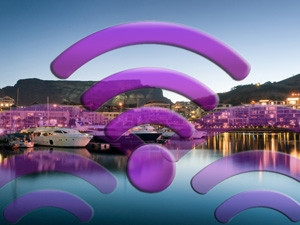
Over a million - 1 026 290 to be precise - is the total number of unique users that have connected to free Internet via the City of Cape Town's WiFi network.
This was revealed yesterday by the city's mayoral committee member for corporate services and compliance, councillor Xanthea Limberg.
According to Limberg, Cape Town has provided accelerated Internet access to more than one million residents, and that number is growing daily.
The Mother City has built an extensive free Internet network by introducing free WiFi zones spread across the metro. To date, the city has installed 363 free WiFi zones, and a further 60 zones are planned to go live by June 2017.
Digital inclusivity is essential in order to connect residents with economic opportunities, online news, social media and other services. Additionally, it helps to deliver improved services to our residents, she says.
"The free WiFi access points have been installed where residents queue for city services, such as clinics and cash offices."
Leading example
As part of its digital strategy and efforts to position itself as the most digitally connected city in Africa, Cape Town has budgeted R1.3 billion for a multi-year broadband infrastructure investment project.
The seven-year broadband network roll-out project will see the city build a core fibre-optic network to connect city buildings, government buildings as well as private buildings in the central business district.
This financial year, the city's capital budget for its broadband project is approximately R200 million.
Other elements of the strategy include investment in digital infrastructure, digital business initiatives, and a focus on digital government.
Most of this budget has been dedicated to installing fibre-optic cables and switching capacity in areas such as Harare, Kuyasa, Khayelitsha, Atlantis, Delft, Lentegeur, Site C, Mitchells Plain, Nyanga, Hanover Park and Seawinds, where there was previously no broadband infrastructure, according to Limberg.
"This approach results in a lasting asset that will benefit residents for years to come. A number of pilot projects have been run jointly between the city and Internet service providers in these areas and others."
Although the free WiFi service is popular for general Web browsing and e-mail, the top four most commonly used applications are YouTube, Google, Facebook and WhatsApp, she states.
"Cost-effective and high-speed Internet access for communities has become a necessity... As a progressive city, we need to ensure that we are ready for this revolution by providing our residents with access to digital literacy and skills.
"We are on the right path and well prepared for this era. We will therefore continue to honour our commitment and get on with providing free WiFi zones, both inside and outside public buildings, and extending these to public spaces across the city."
Challenging times
While Cape Town aims to be Africa's most digitally connected city, it has admitted its digital programmes are disrupted by crime.
Earlier this year, Western Cape premier Helen Zille said efforts to connect disadvantaged schools to free Internet were being hampered by high levels of crime in broadband network deployment areas.
In addition to the criminal offences that occur when a broadband network is being rolled out, incidents of cable theft have also become an issue in the Western Cape.
It is quite disheartening to note that many residents, especially learners and students, are being deprived of the opportunity to make use of these free essential services, says Limberg.
A number of our libraries have suffered repeated acts of cable theft that have left them without Internet connectivity, she adds.
"We condemn such selfish and wanton acts of vandalism, which have robbed residents of much-needed digital access. This has led us to think cleverly and come up with an innovative solution.
"Access to the Internet is being switched to our broadband infrastructure, which is a sustainable solution and will ensure that marginalised communities are no longer deprived of accessing the worldwide Web as a result of cable theft. The city is therefore investing in connecting all of the city-owned facilities and buildings to its robust broadband network."
Share